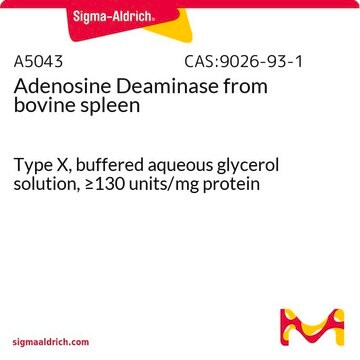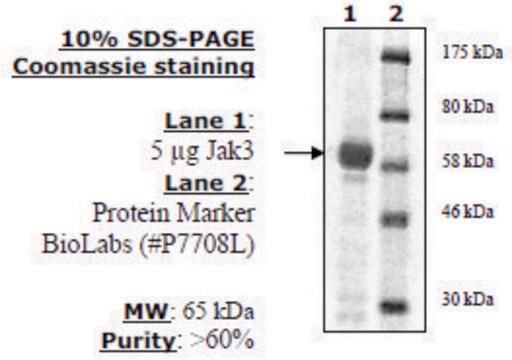A5168
Adenosine Deaminase from bovine spleen
Type IX, ammonium sulfate suspension, 150-200 units/mg protein
Synonym(s):
Adenosine aminohydrolase
About This Item
Recommended Products
biological source
bovine spleen
Quality Level
type
Type IX
form
ammonium sulfate suspension
specific activity
150-200 units/mg protein
mol wt
32.5-33 kDa
UniProt accession no.
foreign activity
5′-AMP deaminase ≤0.01%
alkaline phosphatase ≤0.01%
guanase ≤0.01%
nucleoside phosphorylase ≤0.1%
storage temp.
2-8°C
Gene Information
cow ... ADA(280712)
Looking for similar products? Visit Product Comparison Guide
Related Categories
General description
pI: 4.85
Application
Biochem/physiol Actions
Unit Definition
Physical form
Analysis Note
Storage Class Code
10 - Combustible liquids
WGK
WGK 3
Flash Point(F)
Not applicable
Flash Point(C)
Not applicable
Personal Protective Equipment
Certificates of Analysis (COA)
Search for Certificates of Analysis (COA) by entering the products Lot/Batch Number. Lot and Batch Numbers can be found on a product’s label following the words ‘Lot’ or ‘Batch’.
Already Own This Product?
Find documentation for the products that you have recently purchased in the Document Library.
Customers Also Viewed
Articles
Instructions for working with enzymes supplied as ammonium sulfate suspensions
Our team of scientists has experience in all areas of research including Life Science, Material Science, Chemical Synthesis, Chromatography, Analytical and many others.
Contact Technical Service








